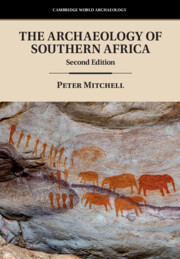Book contents
- Frontmatter
- Contents
- List of Figures
- List of Tables
- Acknowledgments
- 1 Introduction
- 2 Frameworks
- 3 Contexts
- 4 Origins
- 5 A Cognitive Revolution
- 6 Hunter-Gatherers of the Late Pleistocene
- 7 Archaeologies of the Pleistocene/Holocene Transition
- 8 Hunting, Gathering, Intensifying: Forager Histories in the Holocene before 2000bp
- 9 Taking Stock: Herders and Hunter-Gatherers
- 10 Farmers and Foragers: the First Millennium
- 11 Forming States: the Zimbabwe Culture and its Neighbours
- 12 Recent Farmers and Hunter-Gatherers in Southernmost Africa
- 13 Colonisation, Conquest, Resistance
- 14 Perspectives and Prospects
- Glossary
- References
- Index
9 - Taking Stock: Herders and Hunter-Gatherers
Published online by Cambridge University Press: 15 May 2024
- Frontmatter
- Contents
- List of Figures
- List of Tables
- Acknowledgments
- 1 Introduction
- 2 Frameworks
- 3 Contexts
- 4 Origins
- 5 A Cognitive Revolution
- 6 Hunter-Gatherers of the Late Pleistocene
- 7 Archaeologies of the Pleistocene/Holocene Transition
- 8 Hunting, Gathering, Intensifying: Forager Histories in the Holocene before 2000bp
- 9 Taking Stock: Herders and Hunter-Gatherers
- 10 Farmers and Foragers: the First Millennium
- 11 Forming States: the Zimbabwe Culture and its Neighbours
- 12 Recent Farmers and Hunter-Gatherers in Southernmost Africa
- 13 Colonisation, Conquest, Resistance
- 14 Perspectives and Prospects
- Glossary
- References
- Index
Summary
Livestock first entered southern Africa a little over 2,000 years ago and by the mid−1600s Khoe-speaking herders were widely distributed across the western third of the region. Debates over how pastoralist societies developed and how and by what routes livestock were introduced have been transformed over the past two decades by significant major fieldwork projects, a growing number of detailed genetic and linguistic studies, and new interpretative frameworks partly inspired by deeper acquaintance with pastoralist practice in East Africa. Important advances have also been made in understanding Khoe rock art, the chronology of pottery, and the relevance of disease in constraining the southward spread of livestock. This chapter reviews these developments, while also grappling with the thorny question of how, if at all, forager and herder societies can be differentiated archaeologically and what form relations took between those who kept domestic livestock and those who did not. Questions of identity (ascribed and asserted) and the degree of coherence to be expected between genetic, linguistic, ethnographic, historical, and archaeological sources come to the fore.
- Type
- Chapter
- Information
- The Archaeology of Southern Africa , pp. 231 - 271Publisher: Cambridge University PressPrint publication year: 2024



